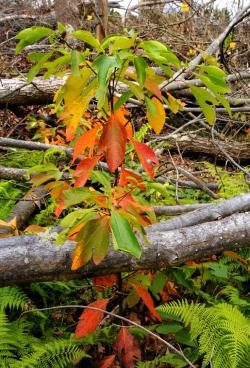Nature seems able to take care of itself without our help, according to the results of a 20-year study at the Harvard Forest.
The research, soon to be published in the journal “Ecology,” outlines how forests bounce back after sustaining severe damage, independent of human assistance. The scientists studied ecological growth in a two-acre plot where they had pulled down trees to simulate the effect of a major hurricane on a forest in order to see how forests recuperate after natural disasters. The study looked not only at damage to large trees, but also ran experiments to investigate how climate change could affect the activity of microbes in the soil, nitrogen concentration, and plant growth.
The experiment was meant to simulate the damage done by the Great Hurricane of 1938, which toppled approximately 70 percent of the Harvard Forest. After that storm, locals led the biggest forest salvage in U.S. history, removing dead wood that researchers today say could have helped in reviving the ecosystem’s health.
The Harvard Forest study began in October 1990. Trees in the experimental plot were either uprooted or snapped by using heavy machinery, simulating the effects of a major hurricane. Compared to the older approach of chopping down trees and leaving them there, this methodology was a significant improvement, the researchers said.
Surprisingly, damaged trees in the plot not only grew back but fully uprooted trees continued to live and produce leaves for the first few years after manipulation. Within about six years, biomass production in the plot was still lagging but biological processes in the forest were back to normal. This contrasts with prior hypotheses that without human interference, growth would be hindered by pest infestation or fire outbreaks, neither of which posed problems in this experiment. Also striking was the discovery that the “new” forest was again dominated by previously dominant saplings and seedlings, as opposed to less prominent species that had out-lived stronger competitors immediately after the storm.
“The fact that the forest recovered so effectively was not surprising but the way in which it recovered was surprising,” said David Foster, Harvard Forest Director and overseer of the project. “Normally[...]we look at a forest that’s been burned, or a forest that’s been blown down, or an area that’s been flooded as being ruined or destroyed or damaged,” he said.
“But these are, of course, natural processes forests have dealt with forever.”
Audrey Barker-Plotkin, primary researcher on the project, shares Foster’s sentiment.
“It’s very humbling, in a way, to see a forest change before your eyes,” she said. “When you see a forest you love blown down or harvested, it’s really difficult to believe that it will come back.”
Both cited the importance of being able to conduct long-term studies such as this one.
“It’s important to see how critical it is to study ecological processes over a long period of time,” said Foster.
He added that these results have important implications for not only the way in which scientists conduct research in forestland, but also attitudes towards treatment of natural ecosystems at large.
“If we are trying to work with Nature and accomodate and help Nature,” said Foster, “We have to do it on Nature’s terms.”
—Staff writer Anneli L. Tostar can be reached at annelitostar@college.harvard.edu.
Read more in News
‘Cyborg Tissue’ CreatedRecommended Articles
-
A CHINESE LEGEND.THE storm-cloud Roc is passing by, Stretching across the sunlit sky; The sun is hid by its outstretched wings, And
-
Harvard Invests in ForestsEven the savviest money managers could learn a thing or two from the Harvard Management Company (HMC) about diversifying one’s
-
Harvard Forest Director Earns Award for Preserving Landscape for Public UseWith an ambitious plan to protect the environment and promote landscape development, Director of the Harvard Forest David R. Foster and his colleagues were recently honored with the Charles Eliot award.
-
 1. Foxglove
1. Foxglove -
From Cannes: "Trees" Not So Bad As ReportedIn the Crimson's continuing coverage of Cannes, Alan Xie reviews Gus Van Sant's "Sea of Trees," which drew boos from the critics in attendance.














